Independent, rebellious and freedom-loving Dublin often greets guests with drizzling rains, winds and gloomy skies. But this does not lose the attractive force of this city, where the traditions of the ancient Celts and Gaels are still alive, where the pugnacious spirit of the Irish Republican Army still walks the streets and the dashing battle cry “Erin Go Bragh” is not forgotten.
Once Dublin was an eternal thorn in the envious eye of the British Empire. For centuries, the city fought for independence and gave the stiff English lords a lot of trouble. Now Dublin is a picturesque European capital, a symbol of free Ireland and a place of attraction for tourists from all over the world. Here they celebrate the merry St. Patrick's Day on a grand scale, proudly show the Beer Museum to foreigners and continue to hope to take the rest of the country from the greedy English.
What to see and where to go in Dublin?
The most interesting and beautiful places for walking. Photos and a short description.
- Trinity College
- Book of Kells
- Dublin Castle
- Grafton Street
- Temple Bar area
- St. Patrick's Cathedral
- Cathedral Church of Christ
- Guinness Beer Museum
- National Leprechaun Museum
- National Museum of Ireland
- National Gallery of Ireland
- Irish Museum of Modern Art
- Abbey Theater
- Chester Beatty Library
- Kilmanham Prison
- Dublin Main Post Office
- Dublin Needle
- Croke Park
- Samuel Beckett Bridge
- Glasnevin Cemetery
- National Botanical Garden
- St Stephen's Green Park
- Phoenix park
- Dublin Zoo
- St.Patrick 's Day
Trinity College
An old Dublin college, founded by Elizabeth I in 1592 and still successfully holding the brand of one of the best universities in Europe. It is put on the same line with Oxford and Cambridge. Trinity College has an invaluable library collection of 4 million volumes. Among its famous graduates are the writer O. Wilde, the philosopher J. Berkeley and the mathematician W. Hamilton. The facility is open to tourists.
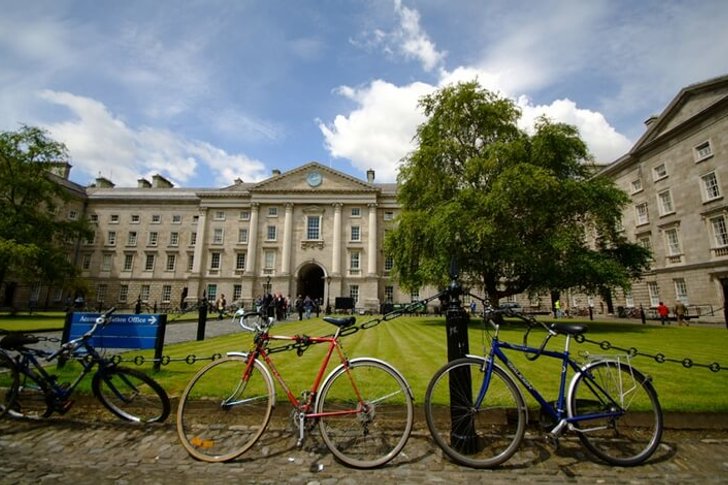
Address: Trinity College, Dublin, Ireland
Phone: +353 1 896 1000
Opening hours: 09:00 - 17:00
Book of Kells
A unique manuscript created in the 9th century, a priceless work of art from the Early Middle Ages. The book is richly decorated with miniatures, patterns and Celtic ornaments. The priceless manuscript has been kept in the library of Trinity College since the 17th century. The book survived the devastating period of the Norman and Viking invasions of the British Isles and was carefully preserved throughout the Middle Ages in Kells Abbey.
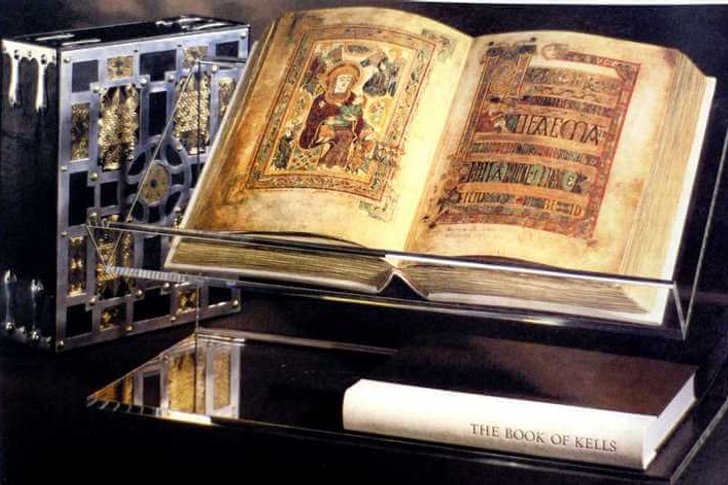
Address: Book of Kells, Dublin, Ireland
Phone: +353 1 896 2320
Opening hours: 09:30 - 17:00
Dublin Castle
The construction was erected in the XIII century, for almost 700 years until 1922, the residence of the English governors was located on its territory. Most of the buildings of the castle complex were built in the 18th century, but still it retained the main features characteristic of Norman architecture - thick walls, powerful battlements and lancet window openings. At the moment, the castle is open for free visits, sometimes it is used for organizing official receptions.
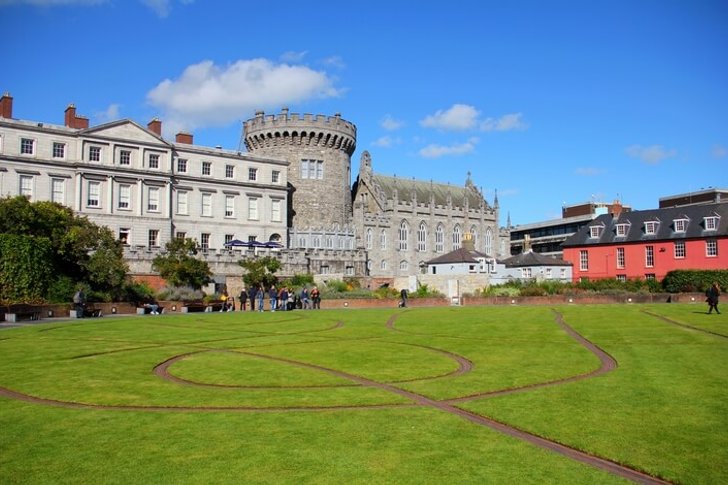
Address: Dublin Castle, Dublin, Ireland
Phone: +353 1 645 8813
Opening hours: 09:45 - 17:45
Grafton Street
Pedestrian street located in the heart of the Irish capital. Grafton Street is the center of the city's tourist life, there are many shops, drinking establishments, street musicians and actors constantly perform. There are many historic mansions along the street, including the house of the head of Trinity College. Grafton Street is one of the five most expensive streets in the world in terms of the cost of renting and buying real estate.
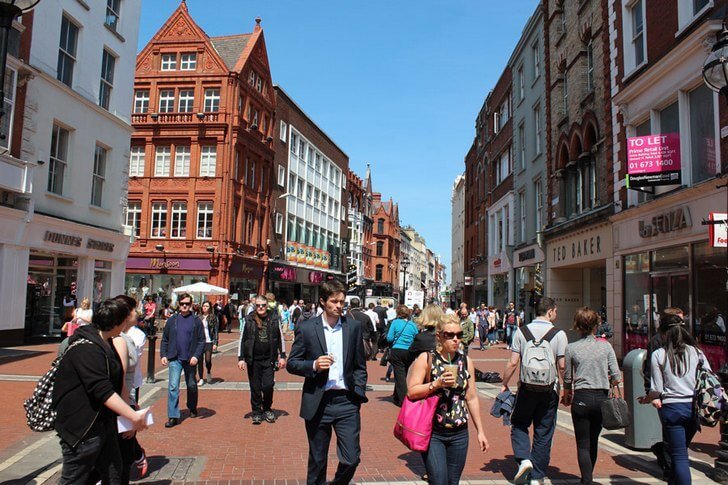
Address: Grafton Street, Dublin, Ireland
Opening hours: 24/7
Temple Bar area
An iconic urban area known for its large number of bars and restaurants. Local streets come to life after 18.00, as numerous streams of people rush here to have a glass or glass after a hard day's work. The area is home to the oldest Irish pub, The Brazen Head, opened in 1198. In some establishments, you can taste more than 600 beers brought from all over the world.

Address: Temple Bar, Dublin, Ireland
Opening hours: 24/7
St. Patrick's Cathedral
The first mention of the temple dates back to the 12th century - by the time it acquired the status of a cathedral, but there is no authentic evidence of the time the building was built. In the 16th century, St. Patrick's Cathedral passed to the Anglican Church of Ireland, despite the discontent of Catholic parishioners. One of the deans of the temple was J. Swift, a well-known Irish writer. In the XVIII-XIX centuries. The ceremony of initiation into the Order of St. Patrick was held here.
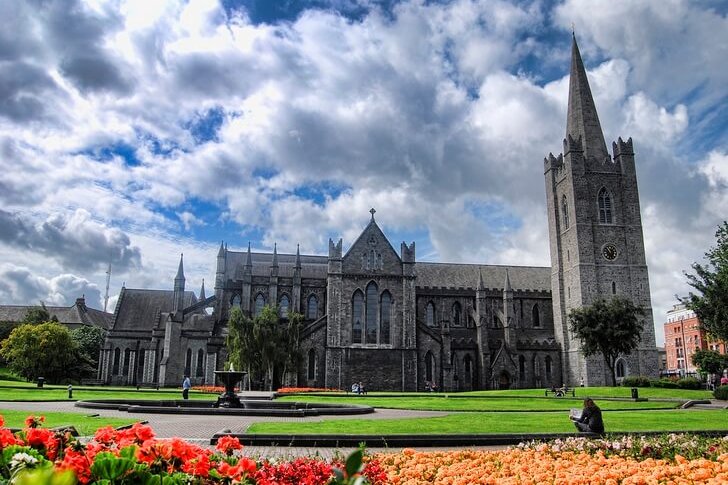
Address: St. Patrick's Cathedral, Dublin, Ireland
Phone: +353 1 453 9472
Opening hours: 09:00 - 17:00
Cathedral Church of Christ
Dublin's main cathedral, built at the very beginning of the 11th century. The original facade of the temple has survived to this day, but the interior has undergone significant changes during the restoration in the 19th century. That is why there are many details of the Victorian era in the interior decor. The temple is jointly owned by the Catholic and Anglican churches. Inside is a relic of the patron saint of Dublin, Archbishop Lawrence O'Toole.
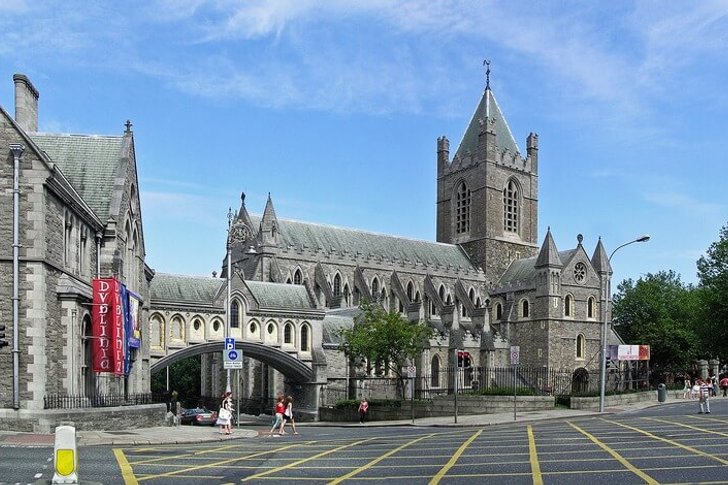
Address: Christ Church Cathedral, Dublin, Ireland
Phone: +353 1 454 4400
Opening hours: 09:30 - 17:00
Guinness Beer Museum
The museum is one of the most popular and visited tourist attractions in Dublin. The Guinness Brewery began operations in the mid-18th century and has since produced a myriad of liters of brew. The Guinness brand has become recognizable and revered in all countries over time. The museum is located in a former fermentation shop, which was stopped in 1988. So that the building would not stand idle in vain, it was decided to open an exposition dedicated to the history of local beer.
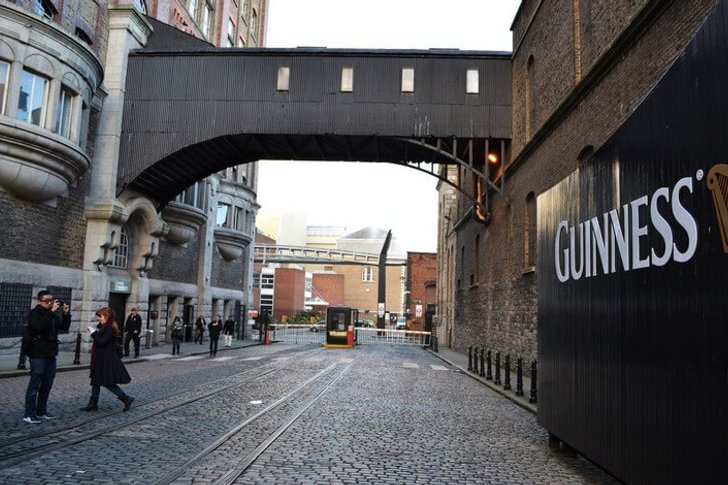
Address: Guinness Storehouse, Dublin, Ireland
Phone: +353 1 408 4800
Opening hours: 09:30 - 19:00
National Leprechaun Museum
The fabulous creatures leprechauns are the symbol of Ireland. Many times they became the heroes of fairy tales, myths, folk legends. The main passion of a leprechaun is his pot of gold, with which he does not part for a second. As a tribute to these original characters, as well as to develop traditional folklore, a museum dedicated to the world of Irish fairy tales was opened in Dublin in 2003.
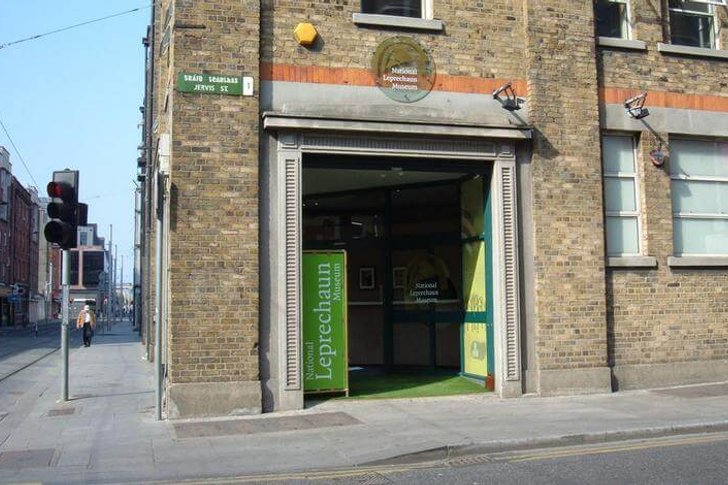
Address: National Leprechaun Museum, Dublin, Ireland
Phone: +353 1 878 7099
Opening hours: 10:00 - 18:00
National Museum of Ireland
The museum was founded in the 19th century. Its exposition tells about the ancient and rich history of Ireland. In the exhibition halls you can see weapons, ceramics, folk costumes, furniture, jewelry and other items belonging to different eras. Also in the museum's funds there are many exhibits of the Celtic period - religious decorations, crosses, various forged products with a recognizable Celtic "ligature".
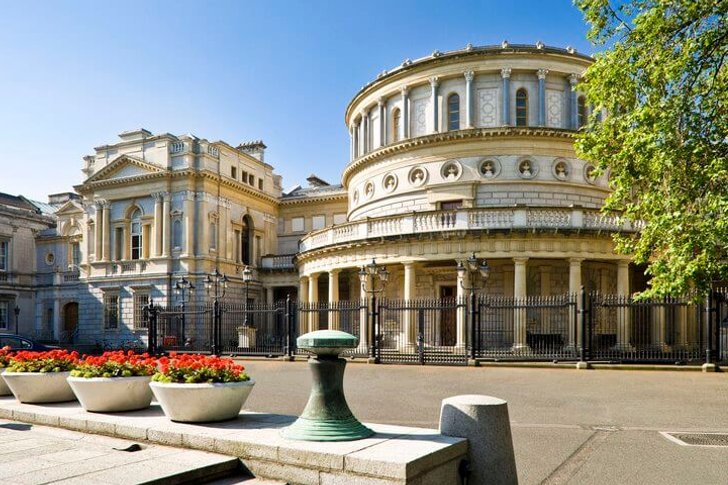
Address: National Museum of Ireland, Dublin, Ireland
Phone: +353 1 677 7444
Opening hours: 10:00 - 17:00
National Gallery of Ireland
An art gallery that exhibits works by Irish masters, as well as artists from Italy, Holland and other European countries. The museum appeared in the middle of the 19th century. At first it was a modest collection of 125 paintings. By the end of the century, the exposition grew due to donations and purchases of works of art by the gallery itself. A new building for the museum was built in the 60s. XX century.
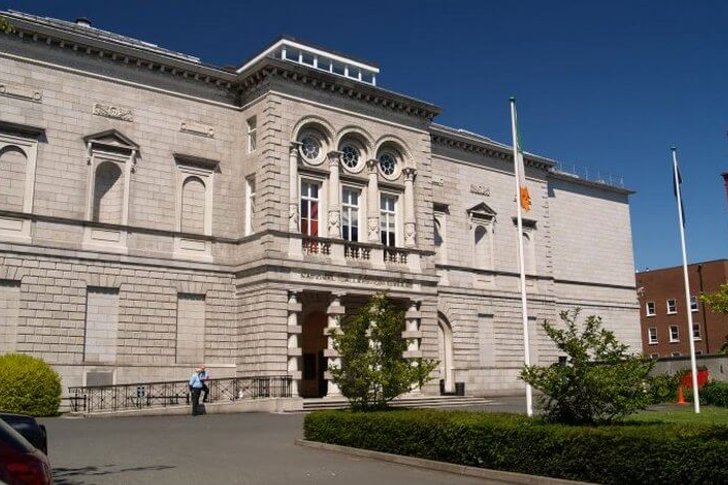
Address: National Gallery of Ireland, Dublin, Ireland
Phone: +353 1 661 5133
Opening hours: 09:15 - 17:30
Irish Museum of Modern Art
The collection is located in the building of the former hospital of the XVII century. A few years after the restoration of the emergency building, it was decided to transfer the premises to the management of the Museum of Modern Art. The gallery is relatively young - the collection began to be exhibited in 1991. Within a few years, the museum has gained respect and has been recognized as one of the leading museums in the British Isles.
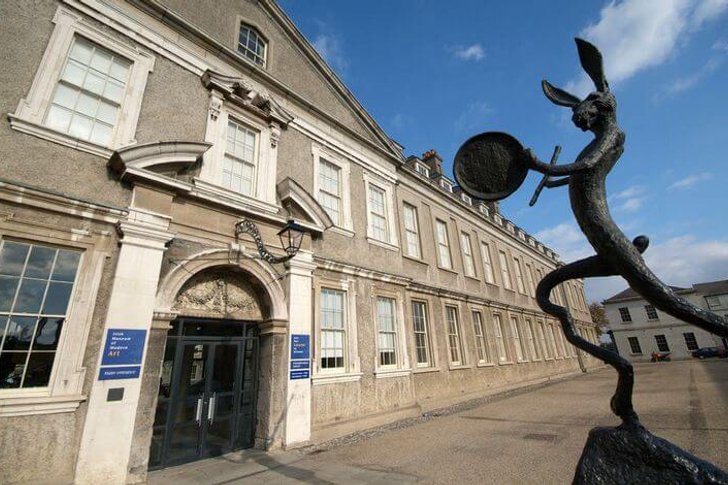
Address: Irish Museum of Modern Art, Dublin, Ireland
Phone: +353 1 612 9900
Opening hours: 10:00 - 17:30
Abbey Theater
Ireland's first national stage, opened in 1904. The theater troupe took an active part in the struggle for the independence of the country in the 1920s. The historic building burned down in 1951, and the new one was built only in 1966. All this time, the actors were forced to wander around other venues. Since its founding, the theater has been a fierce supporter of national art.
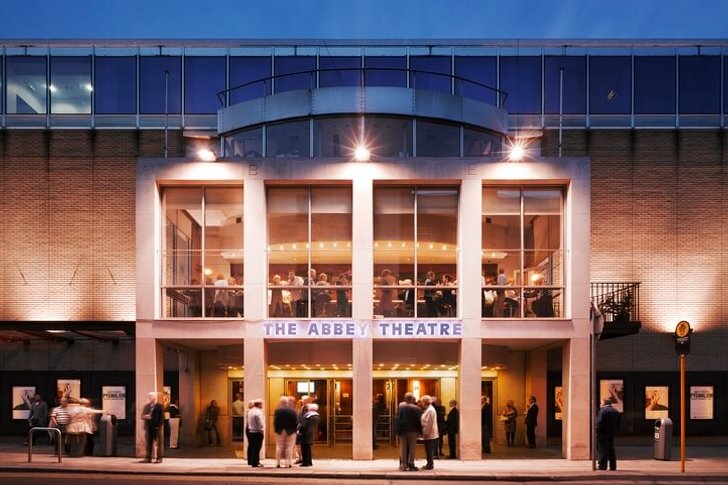
Address: Abbey Theatre, Dublin, Ireland
Phone: +353 1 878 7222
Opening hours: 10:00 - 17:30
Chester Beatty Library
Library and museum in one place, where unique manuscripts of the period of Antiquity and the Middle Ages are stored. There are specimens here that were found in Egypt, Asia and European territory. Some exhibits are over 2,000 years old. The museum was founded in 1950 by a private individual - an American entrepreneur and industrialist A.Ch. Beatty. Since 2002, the collection has been housed on the grounds of Dublin Castle.
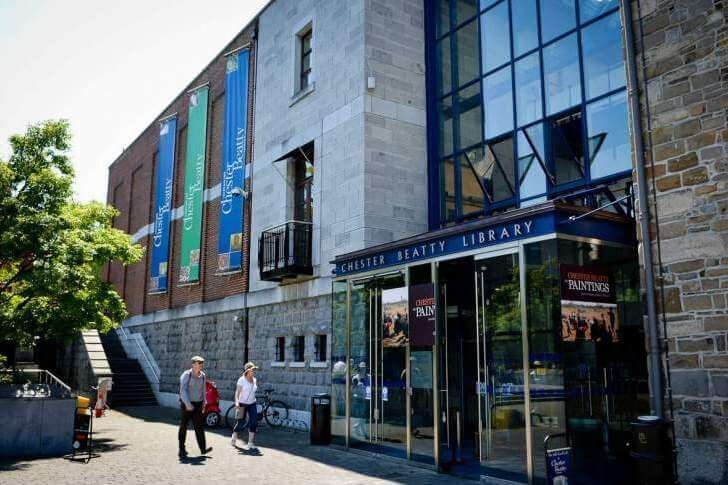
Address: Chester Beatty Library, Dublin, Ireland
Phone: +353 1 407 0750
Opening hours: 10:00 - 17:30
Kilmanham Prison
Former prison, which operated from the 18th to the 20th centuries, now turned into a museum. Mainly, the fighters for the independence of Ireland served their sentences here. Until 1820, death sentences were carried out on the territory of the prison. Kilmanham was a mixed prison - women, men, and even children were kept here, since severe punishment was due even for a minor offense. The leaders of five Irish rebellions were imprisoned in this prison; in 1924 it was closed by decision of the new independent government.
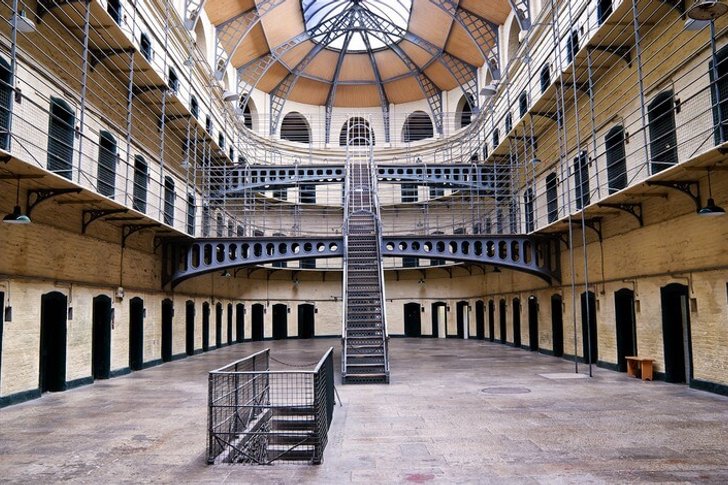
Address: Kilmainham Gaol, Dublin, Ireland
Phone: +353 1 453 5984
Opening hours: 09:30 - 18:00
Dublin Main Post Office
The historic head office of the Irish Post Office, located on O'Connell Street. In 1916, during the last (Easter) Rising, the headquarters of the revolutionaries was located here. After part of Ireland achieved independence, a museum was opened in the building of the main post office, where the original Declaration of Independence was placed. Today, the building is perceived as a symbol of Irish nationalism.

Address: General Post Office, Dublin, Ireland
Phone: +353 1 705 7600
Opening hours: 09:00 - 17:30
Dublin Needle
A needle-shaped monument located on O'Connell Street, erected on the site of the blown up monument to the English Admiral Nelson. The statue was destroyed in 1966 by members of the terrorist organization IRA. The Dublin Needle was built in 2003. It reaches a height of 121.2 meters, while the diameter of the base of the structure is 3 meters. The structure gradually narrows and ends with a spire.
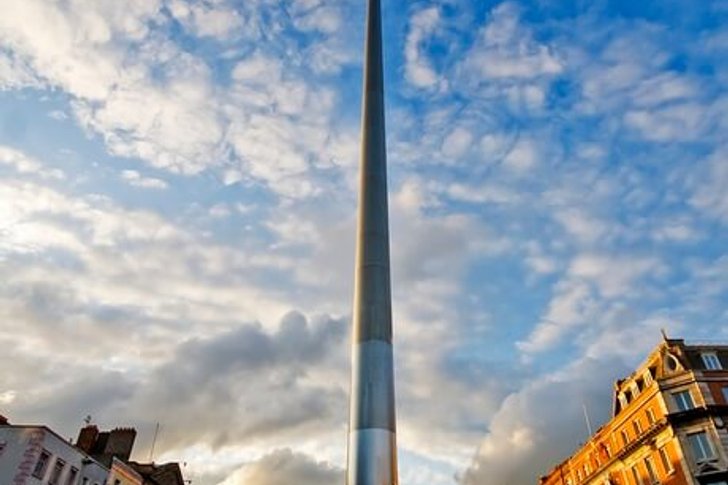
Address: The Spire, Dublin, Ireland
Opening hours: 24/7
Croke Park
A sports arena built in 1884 for the "Gaelic Games" - curling and Gaelic football competitions, but after a major renovation in 2004, it began to serve as the main stadium in Dublin. Croke Park is designed for 82-83 thousand spectators. For a long time, the Gaelic Athletic Association, which owns the arena, prohibited its use for games of non-Irish origin, but in 2005 the rules were relaxed.
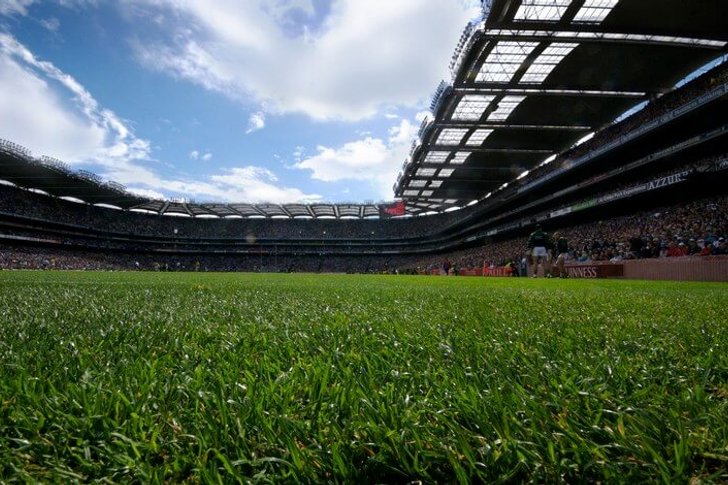
Address: Croke Park, Dublin, Ireland
Phone: +353 1 819 2300
Opening hours: 09:00 - 17:00
Samuel Beckett Bridge
A 2009 cable-stayed bridge connecting the banks of the River Liffey. The structure is 128 meters long and 48 meters wide. Interestingly, the details of the bridge were assembled in Holland and transported to Ireland. The structure quickly became a popular attraction due to its elegance and similarity in appearance to the shape of a harp. The bridge is open to pedestrian and vehicle traffic, and work is also underway on laying tram tracks.
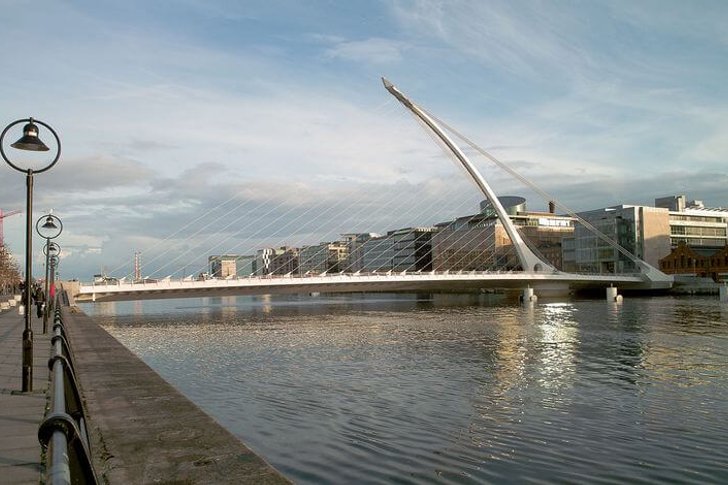
Address: Samuel Beckett Bridge, Dublin, Ireland
Phone: +353 1 222 8888
Opening hours: 24/7
Glasnevin Cemetery
The necropolis is located in the north of Dublin. It is famous for being the first Catholic cemetery to be allowed to separate from a Protestant one. Now it has the status of a museum, and burials on the territory are no longer held. Many politicians of the past, fighters for the country's independence, soldiers killed during the First World War, and ordinary people are buried at Glasnevin Cemetery.
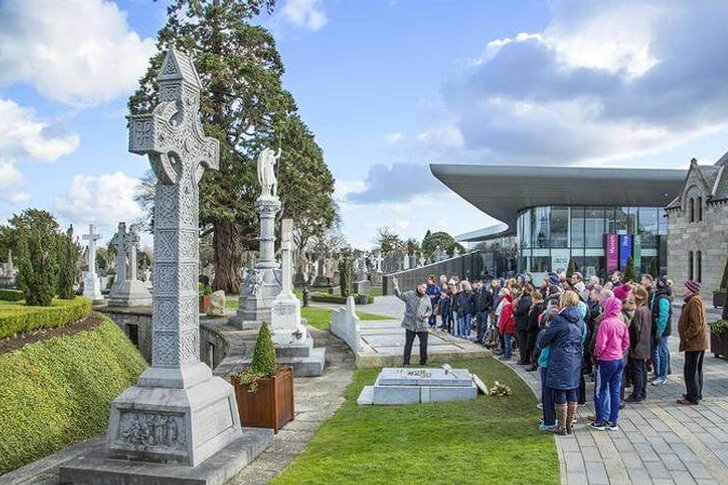
Address: Glasnevin Cemetery, Dublin, Ireland
Phone: +353 1 882 6500
Opening hours: 09:00 - 17:00
National Botanical Garden
The park has a history of more than 200 years, the total planting area is small - only 25 hectares. The garden is famous, first of all, for its plant diversity; more than 20 thousand representatives of the flora grow on its territory. Since Ireland does not have a particularly warm climate, many tropical species are found in indoor greenhouses. There is also an agricultural area in the garden where pumpkins, cucumbers, tomatoes and cabbages are grown.

Address: National Botanic Gardens, Dublin, Ireland
Phone: +353 1 804 0319
Opening hours: 09:00 - 17:00
St Stephen's Green Park
A large city park located in the central part of Dublin. Since the 17th century, this place has been adapted for walks of the urban aristocracy, but in 1880 the park was opened to the public with the participation of A. Guinness, co-owner of the famous brewery. Once upon a time, Queen Victoria suggested that the townspeople name the park in honor of her late husband, Prince Albert, but the Dubliners angrily rejected this idea.
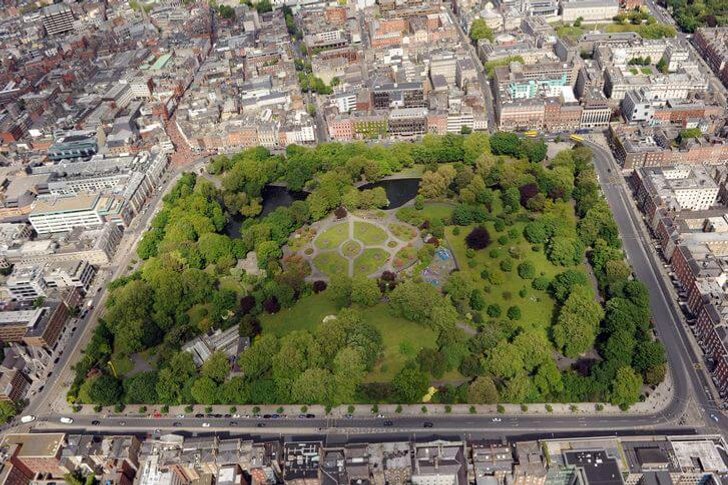
Address: St. Stephen's Green, Dublin, Ireland
Phone: +353 1 222 8888
Opening hours: 07:00 - 21:00
Phoenix park
Phoenix Park is one of the largest green areas located within the city limits. In 1662, hunting grounds were organized here for the Duke of Ormond, the ruler of Ireland. Even earlier, these lands were owned by the Abbey of Kilmenham, but under Henry XVIII they were confiscated in favor of the crown. In 1745 the park was opened to the public with the assistance of the Earl of Chesterfield.
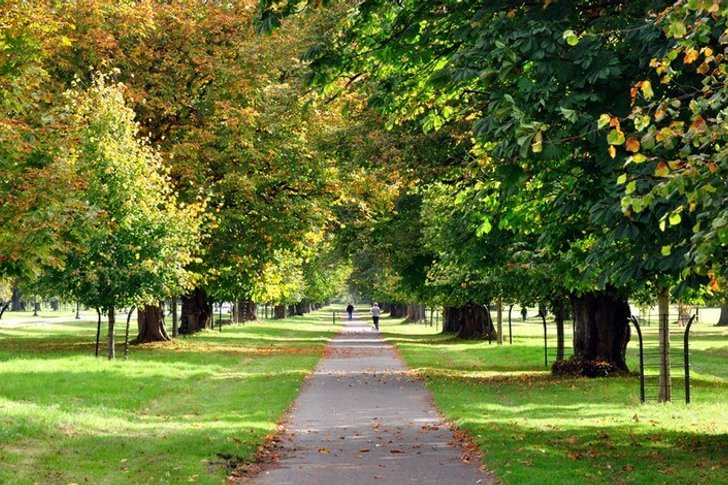
Address: Phoenix Park, Dublin, Ireland
Phone: +353 1 823 0817
Opening hours: 24/7
Dublin Zoo
The city menagerie is located on the territory of Phoenix Park. In addition to the standard inhabitants, rare breeds of domestic animals, as well as representatives of endangered species, live here in a special zone. The Dublin Zoo was founded in 1830, and for the second century in a row it has been a popular place for excursions, recreation, communication with nature and acquaintance with amazing animals.

Address: Dublin Zoo, Phoenix Park, Dublin, Ireland
Phone: +353 1 474 8900
Opening hours: 09:30 - 17:00
St.Patrick 's Day
A bright, cheerful and colorful national holiday, which has been celebrated since the beginning of the 17th century every year on March 17th. It is dedicated to the patron saint of Ireland - St. Patrick, who lived in the IV-V centuries. On this day, the Irish put on green clothes, paint in the colors of the national flag, organize processions and parades. In the evening, everything ends with a fun drinking party. The official symbol of St. Patrick's Day is the clover shamrock.
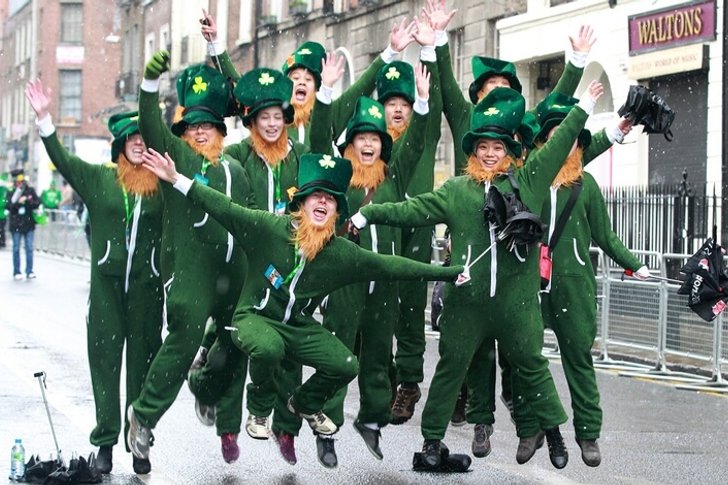
Address: St. Patrick's Day, Dublin, Ireland
Opening hours: 24/7